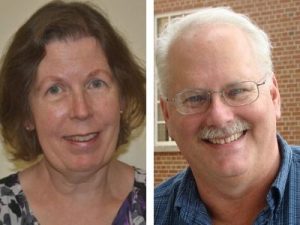Gillings Researchers Advance in the Quest for a Dengue Vaccine
May 13, 2020
Gillings School of Global Public Health

Ellen Young and Ralph Baric left to right
Dengue viruses are estimated to cause approximately 390 million infections and 100 million cases each year around the globe, ranging from mild fever to severe Dengue Hemorrhagic Fever and Dengue Shock Syndrome. Because infection with one of the four unique dengue strains does not provide lasting immunity to the other strains, it has been especially difficult to create an effective vaccine that avoids increasing recipients’ risk of secondary infections.
A new study led by researchers at the UNC Gillings School of Global Public Health adds a valuable piece to the dengue vaccine puzzle. Researchers worked with colleagues in Nicaragua to investigate the human B cell response of three children who had been infected with dengue in endemic areas of the country. Ultimately, the research team mapped standout antibodies from the children, which could potentially be included in a future vaccine.
The full paper, titled “Identification of Dengue Virus Serotype 3 Specific Antigenic Sites Targeted by Neutralizing Human Antibodies,” was published online May 13 by Cell Host & Microbe.
Co-authors at the Gillings School include first author Ellen Young, research associate; corresponding author Ralph Baric, William R. Kenan, Jr. Distinguished Professor; David Martinez, postdoctoral fellow; Jennifer Munt, research specialist; Longping Tse, research associate; and Deanna Zhu, doctoral student — all with the Department of Epidemiology.
“We mapped areas of the Dengue 3 virus that are targeted by children’s immune system,” says Young. “We also made a set of tools that can be used to measure which area of the virus is being targeted by an individual’s immune system. This information will help with vaccine design and add to our knowledge of what it means to be immune to dengue virus.”
